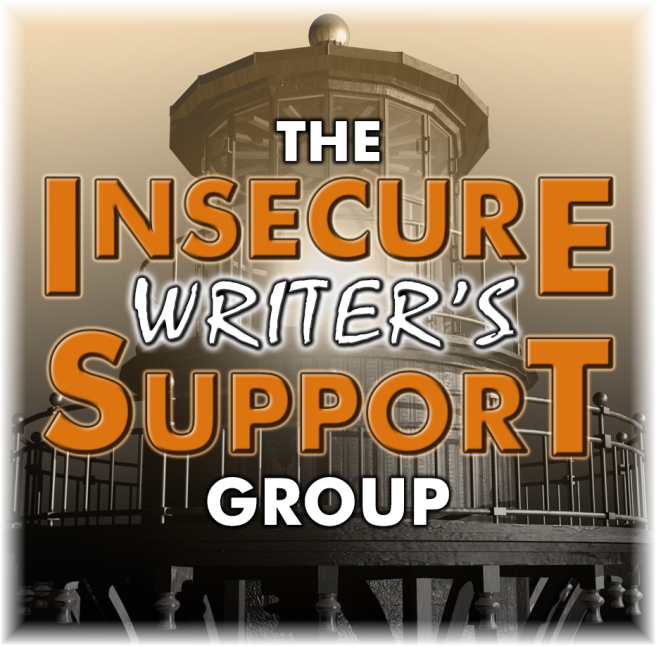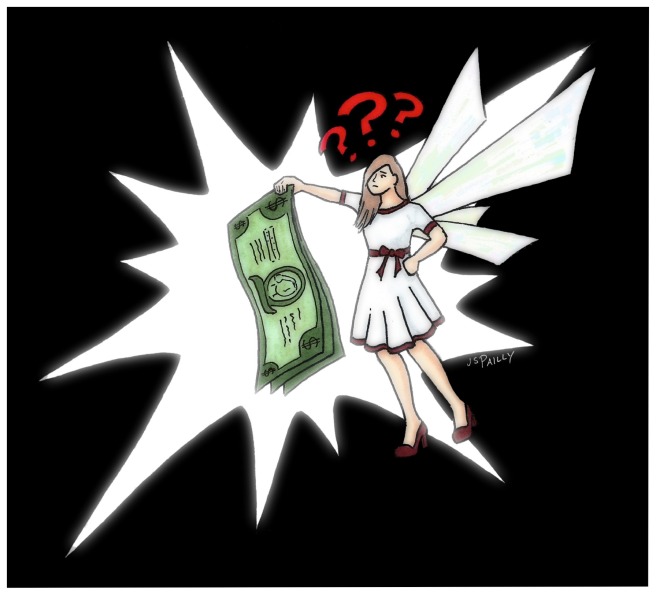Hello, friends! Welcome to this month’s meeting of the Insecure Writer’s Support Group. Are you a writer? Do you feel insecure about your writing? If so, then this is the support group for you! Click here to learn more!
So I promised myself that I wouldn’t talk business here on the blog, but today I’m going to talk business here on the blog. You see, I’m in the process of developing a new business plan for both my writing and my art. Last weekend, I had a meeting with my editor. I’ve also been doing a bit of research about S.E.O. I’m starting to put together an outline of goals and strategies. I feel good about all this stuff I’m doing. I feel confident. My muse, on the other hand, is getting very nervous.
As you know, muses come from a land of pure imagination, and (for obvious reasons) nobody needs money in a land of pure imagination. My muse has heard of money before, but she doesn’t fully understand what money is or how it works. She’s never used it for anything except as a plot device.
And when it comes to businesses and business plans, my muse has only the vaguest of notions about what all that means (I only have vague notions about it, too, but I’m learning). Don’t be wasteful, don’t be inefficient, do be competitive and aggressive, do cut costs anywhere and everywhere you can, do ramp up production and increase your sales, always deliver value to your customers (whatever that means), never forget about the bottom line—that’s what businesses do, right? But that sort of super strategic, super economical mindset—that is totally anathema to how muses operate.
The creative process is inherently inefficient. It’s inherently messy, chaotic, and unpredictable. A muse and her writer/artist must feel free to make mistakes; they must be able to experiment and take creative risks; they must allow themselves to waste a whole bunch of time and energy on ideas that almost certainly will not work out.
The last two years were something of a wake up call for me. I really do need to take the business side of writing and art more seriously. But as I go about putting together my new business plan, I know I must also keep my muse happy. In fact, I’ve decided that keeping my muse happy should be job #1 in this new business plan of mine. Even if it means missing the occasional deadline, even if it results in earning less money, even if it does not seem (at first) to be good for the bottom line, allowances must be made for the “wastefulness” and “inefficiency” of the creative process, because if I cannot make those allowances, well… then maybe this is not the right “business” for me after all.


Let’s face it, you’d be nothing without your muse. Don’t screw up that balance or there’ll be nothing to sell. 😉
Anna from elements of emaginette
LikeLiked by 1 person
Exactly!!!
LikeLiked by 1 person
Balancing art and business is a struggle artists have had to deal with since forever… unless you have a wealthy and patient patron. But I’m sure even Michelangelo had his bosses breathing down his neck to finish the ceiling, and Dickens had to write to pay his Netflix bills (or whatever Victorians spent their money on). We’ve all been there.
LikeLiked by 2 people
I’m sure that’s true. I’m also sure there’s no one-size-fits-all solution. We each have to find a balance that works for us.
LikeLike
The business part isn’t fun, and the muse is all about fun. Lose that, and then what’s the point?
LikeLiked by 1 person
Exactly. I mean, there are far easier ways to make money, if that were the only reason I was doing this.
LikeLike
Good luck to you, James! I’ve been a full-time writer for 5 years now, and I can say that it’s definitely not an easy way to earn a living. But it can be immensely rewarding if it works out. Only around 1% of writers manage to make it work as a full-time job, and I only managed because I had money in the bank to act as a buffer during the early years. To succeed as a full-time writer, the business and marketing side needs to be your friend. If you don’t enjoy that kind of thing, it will be even harder to succeed.
Given the difficulty in earning a living as a writer, I think you need to ask the question: do you want to enjoy writing part-time, with complete freedom to do whatever you want, or do you want to spend all your time writing? If the latter, you’ll need a certain discipline. For example, I keep a file of ideas for books that I know I will probably never write, because they just won’t pay the bills.
LikeLiked by 2 people
If there’s one thing I learned in the last year or two, it’s that I really do want to spend all my time writing. Maybe I wasn’t 100% sure about that before, but I’m sure of it now, and I’m willing to do what it takes to make it work.
LikeLiked by 1 person
Interesting James, I’m going through a similar process in my coaching work. I’ve previously chosen to work in an area about which I am passionate, but also find hard to monetise. No matter what methodology I learn, I feel it’s simply wrong from an ethical standpoint to do so, so it doesn’t get done. By working with a business coach myself, I’ve decided to change my niche to one where I’m comfortable charging the money I need to in order to have a viable business, and that will allow me – in time – to provide pro-bono support in my previous niche.
I know it’ll be tough to balance business you with creative you, but I’m sure you and your muse will find a way for it to work. All the best with the process.
LikeLiked by 2 people
Thanks, and same to you in your process. I’m confident that I’ll be able to find that balance. Right now, I’m just trying to give myself time to figure out the details. I don’t want to take too long, of course, but I also don’t want to rush myself unnecessarily.
LikeLiked by 2 people
It definitely is tricky. Many times, before I know it, I’ve spent too much time on marketing/networking and am left with too little time to write or revise the story. I have to keep reminding myself about the time allotment.
LikeLiked by 2 people
Balancing the business side of writing with the writing itself is hard. I need to keep telling myself that if I want to sell the story then I have to make time to promote it; if I’m going to have a story to promote and sell then i have to write the story. So I must allot time for both because they almost go hand-in-hand.
LikeLiked by 1 person
Making time to do both is tricky. Switching between those tasks is tricky, too. I usually need some sort of break between writing time and marketing/networking time, because if I’m in the right headspace for one, I am definitely not in the right headspace for the other.
LikeLike
I love this post! There is nothing more precious than that lifeline to the ether – to the “inspired whatevers”, as my grandmother used to call it – or as we call it, the muse.
LikeLiked by 1 person
The “inspired whatevers” is a wonderful term. If writing is to be a business, it has to be a different kind of business. That’s my thinking right now, at least.
LikeLike
This is a great post and has me thinking about how to go about writing as a business if/when the time comes. At the moment I’m enjoying the freedom of being a part-time writer who isn’t dependent on the income from it (which is good, because so far I haven’t had any 😞), but at some point I would like to pursue it more seriously and will need to remember to maintain that healthy relationship with my muse too.
LikeLiked by 1 person
There are definitely advantages to writing part time. Creative freedom is one of them. I’m a little worried about losing some of that freedom; however, the circumstances of my life right now mean that I really have to try my best to make this work. So that’s what I’m going to do.
LikeLike